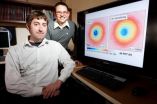(Press-News.org) As partners in the international research consortium named MetaHit, scientists from the University of Copenhagen have contributed to show that an individual's intestinal bacteria flora, regardless of nationality, gender and age, organises itself in certain clusters. The cluster of intestinal bacteria flora is hypothesised to have an influence on how we react to both our diet and medicine absorbed through the gastro-intestinal tract. The results have recently been published in the journal Nature.
Most people know about blood types, some also know about tissue types. However, now we may need to consider intestinal bacteria types as well. As part of a large, international research consortium, scientists from the University of Copenhagen have recently contributed to map special "enterotypes", which are three distinctive clusters of bacteria in the human distal gut. Each of these enterotypes reflects a certain balance between various categories of bacteria in the distal gut, and is thought to impact intestinal bacteria digest food leavings, and utilise these for energy delivery to the gut and the whole body energy metabolism, and on how various drugs are absorbed through the gastrointestinal tract.
The outcome of the project has recently been reported in the journal Nature's online publication for results that deserve immediate exposure.
"The discovery of enterotypes is expected to influence future research within a number of fields," explains Professor Oluf Borbye Pedersen, professor at Novo Nordisk Foundation Center for Basic Metabolic Research at the Faculty of Health Sciences, the University of Copenhagen, and also one of the lead investigators in the international research consortium MetaHIT, which has conducted the project.
"Our results show that we may have uncovered a new 'biological fingerprint' on the same level as blood types and tissue types. The three enterotypes occur across nationalities and are independent of gender and age. Every enterotype has a certain composition of bacteria that have specific functions, for example energy production from degradation of dietary fibres or formation of certain vitamins. This may potentially affect a number of biological functions – discoveries which at a later stage may be translated into individual diet advice or design of drugs that are adapted to the individual enterotype," Oluf Borbye Pedersen adds.
He underlines that the results published in Nature do not show anything about the precise mechanisms by which the three enterotypes individually affect people that host the bacteria. After further research, more intestinal bacteria clusters will most likely be added to the three enterotypes, which have been identified so far. However, the discovery of their existence gives researchers new opportunities for studying how the about 1.5-kilo gut bacteria, which we all have in our digestive system, affects our health.
###
The researchers from MetaHIT, an international EU-supported project, have studied 278 volunteers in total from Denmark, Italy, Spain, France, Japan and USA for the paper in Nature. From Denmark, several scientists have contributed from the Novo Nordisk Foundation Center for Basic Metabolic Research at Faculty of Health Sciences, University of Copenhagen; the Lundbeck Foundations Genomics Center, LuCamp; and from the Center for Biological Sequence Analysis, Institute for System Biology at the Technical University of Denmark.
What's your intestinal bacteria type?
New research shows that an individual’s intestinal bacteria flora, regardless of nationality, gender and age, organises itself in certain clusters
2011-04-21
ELSE PRESS RELEASES FROM THIS DATE:
Primordial weirdness: Did the early universe have 1 dimension?
2011-04-21
BUFFALO, N.Y. -- Did the early universe have just one spatial dimension?
That's the mind-boggling concept at the heart of a theory that University at Buffalo physicist Dejan Stojkovic and colleagues proposed in 2010.
They suggested that the early universe -- which exploded from a single point and was very, very small at first -- was one-dimensional (like a straight line) before expanding to include two dimensions (like a plane) and then three (like the world in which we live today).
The theory, if valid, would address important problems in particle physics.
Now, in ...
Ring around the hurricanes: Satellites can predict storm intensity
2011-04-21
CHAMPAIGN, Ill. — Coastal residents and oil-rig workers may soon have longer warning when a storm headed in their direction is becoming a hurricane, thanks to a University of Illinois study demonstrating how to use existing satellites to monitor tropical storm dynamics and predict sudden surges in strength.
"It's a really critical piece of information that's really going to help society in coastal areas, not only in the U.S., but also globally," said atmospheric sciences professor Stephen Nesbitt. Nesbitt and graduate student Daniel Harnos published their findings in ...
Louisville, Kentucky Dentist Offering VIP Rewards
2011-04-21
People in the Louisville area can now have gorgeous smiles for less. Ideal Dentistry in Prospect, Kentucky recently began offering a unique rewards program to their customers.
"I wanted to do something to show our customers how much we appreciate them," said Dr. Christian Hahn. "Our rewards program helps people save money while encouraging them to maintain great oral hygiene."
The VIP program rewards good customers by giving them perks such as 10 percent back on services performed, lifetime warranties on porcelain and gold crowns, no-charge consultations, ...
Does video game violence harm teens? New study weighs the evidence
2011-04-21
COLUMBUS, Ohio -- How much scientific evidence is there for and against the assertion that exposure to video game violence can harm teens?
Three researchers have developed a novel method to consider that question: they analyzed the research output of experts who filed a brief in a U.S. Supreme Court case involving violent video games and teens.
Their conclusion? Experts who say violent video games are harmful to teens have published much more evidence supporting their claims than have experts on the other side of the debate.
"We took what I think is a very objective ...
Presenting cancer treatment options in small doses yields smarter choices
2011-04-21
ANN ARBOR, Mich.---Women who choose among different breast cancer treatment options make smarter choices when getting the information and making decisions in small doses rather than all at once, as is customary, a University of Michigan study found.
It's long been known that people who aren't good with numbers have a harder time understanding the risk information they need to make good medical decisions, says Brian Zikmund-Fisher, assistant professor at the U-M School of Public Health and a research assistant professor at the U-M Health System.
Zikmund-Fisher and co-authors ...
Citizens United case unlikely to end corporate speech debate
2011-04-21
CHAMPAIGN, Ill. — The debate over the constitutionality of regulating corporate speech took a significant turn in the U.S. Supreme Court's Citizens United decision, but it's an issue that almost certainly won't die down in the aftermath of that highly publicized case, says a University of Illinois business law expert.
Law professor Larry E. Ribstein says the court's 5-to-4 ruling in favor of corporate speech has sparked a furor among pundits and the public that shows little signs of ebbing.
"The debate in the aftermath of the Citizens United decision has centered on ...
GOES-13 sees an extraordinarily early Atlantic low in the tropics
2011-04-21
Hurricane season doesn't start in the Northern Atlantic Ocean until June 1, but a low pressure system in doesn't seem to want to follow the calendar. There's a low pressure area with a small chance for development north-northeast of Puerto Rico, and the GOES-13 satellite captured a visible image of the storm.
The National Hurricane Center (NHC) issued a Special Tropical Weather Outlook today, April 20, that noted the low pressure area was located about 460 miles northeast of San Juan, Puerto Rico at 3:35 p.m. EDT. The NHC noted that slow development is possible over ...
TechConnect Ohio Announces Fast-Pitch Networking Event for Ohio Companies and Motivated Jobseekers
2011-04-21
Local Ohio-based companies who rely on IT and technical talent and tech savvy jobseekers alike are invited to attend the debut of TechConnect Ohio, a company sponsored "fast-pitch" networking event that aims to connect motivated jobseekers with employers. TechConnect Ohio will include six hours of sponsor pitches, informal networking and IT workshops in a low-pressure environment, and will be held on Thursday, May 12th 2011 from 12 noon to 6pm at the OCLC Conference Center at 6565 Kilgour Place in Dublin.
"Ohio has exactly what it needs to become a world-class ...
Prenatal exposure to certain pesticides may negatively impact cognitive development in children
2011-04-21
Researchers at Mount Sinai School of Medicine have found that exposure during pregnancy to a family of pesticides called organophosphates may impair child cognitive development. The findings are published online in Environmental Health Perspectives.
From 1998 to 2002, the Mount Sinai Children's Environmental Health Study enrolled a multiethnic population of more than 400 women in their third trimester of pregnancy. The research team collected urine samples during pregnancy and analyzed them for the evidence of metabolized pesticides. The women were then invited to participate ...
Prenatal pesticide exposure tied to lower IQ in children
2011-04-21
Berkeley – In a new study suggesting pesticides may be associated with the health and development of children, researchers at the University of California, Berkeley's School of Public Health have found that prenatal exposure to organophosphate pesticides – widely used on food crops – is related to lower intelligence scores at age 7.
The researchers found that every tenfold increase in measures of organophosphates detected during a mother's pregnancy corresponded to a 5.5 point drop in overall IQ scores in the 7-year-olds. Children in the study with the highest levels ...
LAST 30 PRESS RELEASES:
Tundra tongue: The science behind a very cold mistake
Targeting a dangerous gut infection
Scientists successfully harvest chickpeas from “moon dirt”
Teen aggression a warning sign for faster aging later in life
Study confirms food fortification is highly cost-effective in fighting hidden hunger across 63 countries
Special issue elevates disease ecology in marine management
A kaleidoscope of cosmic collisions: the new catalogue of gravitational signals from LIGO, Virgo and KAGRA
New catalog more than doubles the number of gravitational-wave detections made by LIGO, Virgo, and KAGRA observatories
Antifibrotic drug shows promise for premature ovarian insufficiency
Altered copper metabolism is a crucial factor in inflammatory bone diseases
Real-time imaging of microplastics in the body improves understanding of health risks
Reconstructing the world’s ant diversity in 3D
UMD entomologist helps bring the world’s ant diversity to life in 3D imagery
ESA’s Mars orbiters watch solar superstorm hit the Red Planet
The secret lives of catalysts: How microscopic networks power reactions
Molecular ‘catapult’ fires electrons at the limits of physics
Researcher finds evidence supporting sucrose can help manage painful procedures in infants
New study identifies key factors supporting indigenous well-being
Bureaucracy Index 2026: Business sector hit hardest
ECMWF’s portable global forecasting model OpenIFS now available for all
Yale study challenges notion that aging means decline, finds many older adults improve over time
Korean researchers enable early detection of brain disorders with a single drop of saliva!
Swipe right, but safer
Duke-NUS scientists identify more effective way to detect poultry viruses in live markets
Low-intensity treadmill exercise preconditioning mitigates post-stroke injury in mouse models
How moss helped solve a grave-robbing mystery
How much sleep do teens get? Six-seven hours.
Patients regain weight rapidly after stopping weight loss drugs – but still keep off a quarter of weight lost
GLP-1 diabetes drugs linked to reduced risk of addiction and substance-related death
Councils face industry legal threats for campaigns warning against wood burning stoves
[Press-News.org] What's your intestinal bacteria type?New research shows that an individual’s intestinal bacteria flora, regardless of nationality, gender and age, organises itself in certain clusters




